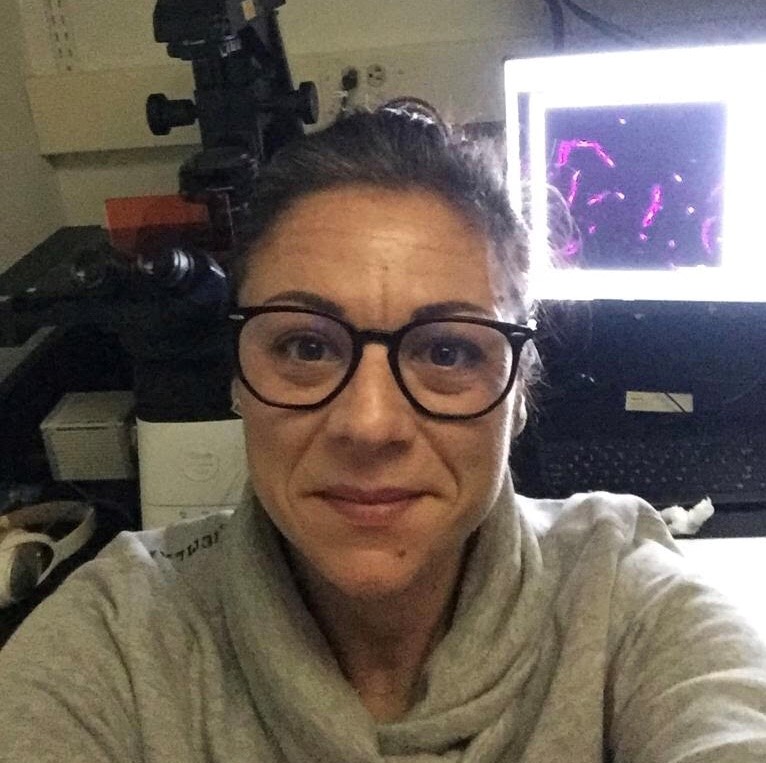DR. ELISA CANEPA
Elisa Canepa earned the Toffler Scholar Award in 2022 at Temple University
Biography
Elisa Canepa was born and grew up in Genoa, Italy, a city on the Ligurian Sea. At the age of six, she discovered that she loved playing volleyball. Her passion for the sport carried well into her early adulthood, culminating in professional-level competition. Dr. Canepa credits her experience as a volleyball player with teaching her how to persevere and remain focused in the face of setbacks. This lesson has been pivotal to her success as a researcher.
Dr. Canepa attended a foreign language high school, where she studied English, French, and German literature and language. Thanks in part to the passion and skill of her science teacher, Maria Rosa, Dr. Canepa became increasingly interested in biology and human anatomy, especially the brain. She was always fascinated by the idea that part of our body makes us who we are.
After graduating from high school, Dr. Canepa attended the University of Genoa, Italy, where she received a B.S. in Biology, an M.S. in Human Biomedical Sciences, and a Ph.D. in Neuroscience. She held postdoctoral positions at University of Genoa, Tufts University, and Columbia University. While at Columbia, she studied the mechanisms underlying edema formation following stroke. Her team identified the enzyme caspase-9 in brain vasculature

as a key player in edema development. This work helped her become proficient in cerebrovascular systems and blood-brain barrier integrity maintenance, two skills vital to her current research on Alzheimer’s disease.
Today, Dr. Canepa is an Associate Scientist at the Alzheimer’s Center at Temple University, Lewis Katz School of Medicine. She and her team are investigating neurovascular dysfunction and neuroinflammation (gliosis) in Alzheimer’s disease (AD).
“Research takes resilience, honesty, commitment, and passion. As a researcher, the rewarding part of my work is not only the long-term goal. The reward is the work I do every day and the data I obtain. Even if my research doesn’t support my hypothesis, even if it is a negative result, that is still information that helps the larger community connect the dots.”
– Dr. Elisa Canepa

Biography
Elisa Canepa was born and grew up in Genoa, Italy, a city on the Ligurian Sea. At the age of six, she discovered that she loved playing volleyball. Her passion for the sport carried well into her early adulthood, culminating in professional-level competition. Dr. Canepa credits her experience as a volleyball player with teaching her how to persevere and remain focused in the face of setbacks. This lesson has been pivotal to her success as a researcher.
Dr. Canepa attended a foreign language high school, where she studied English, French, and German literature and language. Thanks in part to the passion and skill of her science teacher, Maria Rosa, Dr. Canepa became increasingly interested in biology and human anatomy, especially the brain. She was always fascinated by the idea that part of our body makes us who we are.
After graduating from high school, Dr. Canepa attended the University of Genoa, Italy, where she received a B.S. in Biology, an M.S. in Human Biomedical Sciences, and a Ph.D. in Neuroscience. She held postdoctoral positions at University of Genoa, Tufts University, and Columbia University. While at Columbia, she studied the mechanisms underlying edema formation following stroke. Her team identified the enzyme caspase-9 in brain vasculature as a key player in edema development. This work helped her become proficient in cerebrovascular systems and blood-brain barrier integrity maintenance, two skills vital to her current research on Alzheimer’s disease.
Today, Dr. Canepa is an Associate Scientist at the Alzheimer’s Center at Temple University, Lewis Katz School of Medicine. She and her team are investigating neurovascular dysfunction and neuroinflammation (gliosis) in Alzheimer’s disease (AD).
“Research takes resilience, honesty, commitment, and passion. As a researcher, the rewarding part of my work is not only the long-term goal. The reward is the work I do every day and the data I obtain. Even if my research doesn’t support my hypothesis, even if it is a negative result, that is still information that helps the larger community connect the dots.”
– Dr. Elisa Canepa

Research Focus
Challenges
AD is a chronic neurodegenerative disorder and the most prevalent cause of dementia in elderly people. Around the world, an estimated 50 million people have been diagnosed with AD. As the world’s population ages, the numbers are projected to rise substantially. Despite many promising avenues of research, there is still much we do not understand about this devastating and incurable disease.

Focus and Priorities
Dr. Canepa is researching a new treatment strategy to reduce neurovascular pathology and neuroinflammation in patients with AD.
Research has shown that amyloid beta (Aβ) and tau protein aggregates are common in the brains of people who have AD. Toffler Scholar Dr. Silvia Fossati, the current primary investigator in Dr. Canepa’s lab, previously demonstrated that in vitro, Aβ variants prompt mitochondrial dysfunction and cell death in brain cells, such as neuronal, glial, smooth muscle and endothelial cells. Interestingly, these detrimental events are hampered by acetazolamide (ATZ) and methazolamide (MTZ), carbonic anhydrase inhibitors (CAIs).
Currently, Dr. Canepa is dissecting the impact of the two CAIs in AD mouse models. Her preliminary data indicate that Aβ is present in brain vascular and glial cells, triggering vascular impairment and gliosis. However, the harmful effects are rescued when the mice are treated with CAIs, further supporting the idea that CAIs can reduce cell death, and possibly improve cognitive function in patients with AD.
It is worth mentioning that both ATZ and MTZ are approved by the FDA for the treatment of other conditions, but they have never been tested in AD pathology. Dr. Canepa is working on this.

Benefits
Dr. Canepa hopes that her research will lead to novel therapeutic strategies to fight the development and progression of AD by decreasing cell death, and ultimately restoring vascular tone, and promoting anti-inflammatory/pro-healing states in the brain. Though AD is a deteriorating disorder, she hopes to add one more piece to the puzzle. By better understanding the neurodegenerative processes characterizing AD, she hopes that AD-committed scientists and researchers will find new and better ways to treat this disease, improving the lives of those around the world who are living with it.
Karen Toffler Charitable Trust Investment
Support from the Karen Toffler Charitable Trust will help Dr. Canepa investigate the possibilities of CAI treatment for patients with AD. Because this avenue isn’t directly related to Dr. Canepa’s previous research, finding reliable funding sources for this promising line of research has been difficult.
Dr. Canepa’s first goal is to analyze the mechanisms of neurovascular dysfunction in the presence and absence of CAI treatment in AD mouse model. She hypothesizes that Aβ and tau will induce cell death in brain vascular cells, and CAI treatment will rescue the detrimental processes causing cell death. Similarly, Dr. Canepa and her team will be studying Aβ- and tau-mediated neuroinflammatory events in AD mice treated with CAIs. They anticipate that the presence of Aβ and tau in glial cells will induce cell death and increase pro-inflammatory markers, while CAIs will reduce cell death in astrocytes and microglia, promoting an anti-inflammatory state.
Karen Toffler Charitable Trust Investment
Support from the Karen Toffler Charitable Trust will help Dr. Canepa investigate the possibilities of CAI treatment for patients with AD. Because this avenue isn’t directly related to Dr. Canepa’s previous research, finding reliable funding sources for this promising line of research has been difficult.
Dr. Canepa’s first goal is to analyze the mechanisms of neurovascular dysfunction in the presence and absence of CAI treatment in AD mouse model. She hypothesizes that Aβ and tau will induce cell death in brain vascular cells, and CAI treatment will rescue the detrimental processes causing cell death. Similarly, Dr. Canepa and her team will be studying Aβ- and tau-mediated neuroinflammatory events in AD mice treated with CAIs. They anticipate that the presence of Aβ and tau in glial cells will induce cell death and increase pro-inflammatory markers, while CAIs will reduce cell death in astrocytes and microglia, promoting an anti-inflammatory state.
“I want to provide new information to the scientific community that we can all use to move forward. I hope my research can be a starting point for more research. To me, that’s what science is.”
– Dr. Elisa Canepa